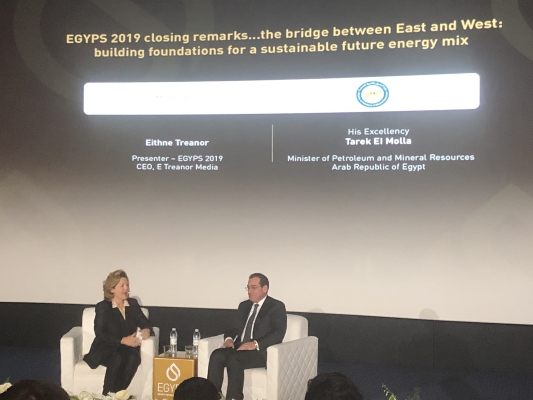Egypt Cultivates the Softer Side of Energy
In an enlightening interview at the end of Egyps 2019 oil and gas strategic conference and exhibition in Cairo, Egypt’s petroleum minister, Tarek El Molla, spoke about a wide-range of issues being pursued in Egypt under his direction, including:
- Women in energy
- Health, safety and environment
- Youth fast-tracking plan
Women in energy
El Molla said he considers this a very important initiative and he is happy to note that it is gaining momentum. In Egypt women are progressively benefiting from equal opportunities to participate and realise their ambitions in the country’s energy sector.
|
Advertisement: The National Gas Company of Trinidad and Tobago Limited (NGC) NGC’s HSSE strategy is reflective and supportive of the organisational vision to become a leader in the global energy business. |
Tarek El Molla (right) in conversation with Eithne Treanor, Egyps 2019

Credit: Charles Ellinas
In order to promote this further the petroleum ministry has set up an equal opportunities unit, to help create a more attractive and conducive environment for women in the oil and gas industry.
Egyps 2019 covered this through a very successful, special, conference entitled ‘Women in Energy’. This included panel discussions on why it is the right time for Egypt and the region to attract, retain and capitalise on women in energy, the impact of culture and building and developing a diverse workforce.
Health, safety and the environment
The ministry has also embarked on a programme to change health, safety and environment (HSE) mindsets and behaviour. This was an area that is lagging behind and facing many gaps and challenges. El Molla saw the need for cultural change, not just training and was instrumental in setting up this programme.
This is being supported by Egypt’s international oil company (IOC) partners and it is successfully helping change HSE culture, with visible results. In fact, Bob Dudley, CEO BP, went as far as to say that safety has improved in Egypt to the extent that it is now delivering to the bottom line.
HSE accountability is now built-in. The career development of energy professionals, managers and executives requires them to gain hands-on experience by being assigned to HSE roles as part of their training, before they can move up the promotion ladder.
This will also be helped further by a programme to improve energy industry governance practices to bring them in line with global practices and increase confidence in Egypt’s energy industry.
Most of these issues were addressed in Egyps’ ‘HSE in energy’ forum, which covered safety culture and effective safety management systems, sustainable working environments, impact of digital solutions and the future of HSE in Egypt and the region.
Youth fast-tracking plan
One of the main pillars of Egypt’s ministry of petroleum modernisation programme is the development of human capital, through a youth talent management and competency development plan. This is designed to include identification of future leaders to take Egypt’s energy industry forward by equipping them with the necessary skills.
This is focused on capacity building of short-listed potential leaders, and taking them through a career development path to enhance their management and business-related competencies and skills. Demonstrating the importance of this plan, Egyps 2019 included a Youth Forum.
El Molla sees it his personal responsibility to build a future based on youth. He said: “It is crucial to understand how to identify, develop and retain such talented people, to generate a dynamic pool of qualified young individuals prepared and equipped to take high-level responsibilities in the future.”
Following an intense identification programme, 400 young oil and gas professionals have been short-listed as having high potential to become future leaders. They are being placed into IOC partner organisations overseas, where they will receive high level training. They are being fast-tracked into becoming Egyptian energy industry’s future leaders. In support of this the ministry signed MoUs with IOC partners and local universities.
El Molla sees this as “his project.” He said he was given this opportunity soon after finishing university and he now considers it his responsibility to help develop others. It is a matter of training and exposure and he wants young people to benefit in the same way.




